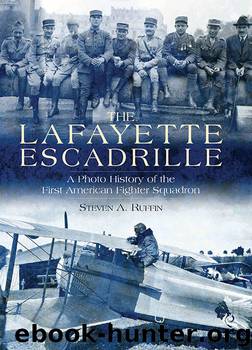The Lafayette Escadrille: A Photo History of the First American Fighter Squadron by Ruffin Steven

Author:Ruffin, Steven [Ruffin, Steven]
Language: eng
Format: epub, azw3
ISBN: 9781612003511
Publisher: Casemate
Published: 2016-05-19T07:00:00+00:00
Two Fewer “Bad Boys”
Other changes were also taking place during this time. The situation with Bert Hall had finally come to a head. Hall’s biographer, Blaine Pardoe, discusses Bert’s standing within the squadron, which was both complicated and controversial, in his book The Bad Boy. According to Pardoe, many of the offenses that authors have attributed to Bert over the past century were true: he probably was, in fact, “a liar and a scoundrel.”
On the other hand, some of the more unsavory things generally ascribed to Hall were, according to Pardoe, exaggerations or out-and-out fabrications by his lifelong enemy, Paul Rockwell. The self-appointed squadron historian never forgave Hall for skipping out on Kiffin’s funeral. Rockwell believed that Bert had, instead, scooted off to Paris to “peddle” the story of Kiffin’s death to the newspapers. Because of this, the bitter elder Rockwell made it his life’s mission to denigrate Hall in every way possible; and being the primary source of information about the squadron, Paul’s assertions have generally been taken at face value and repeated verbatim by almost every author who has ever written about the Lafayette Escadrille. Thus, the historical picture of Bert Hall that resulted from this lifelong smear campaign is probably far worse than was really the case.
In spite of Bert’s transgressions, either real or perceived, there is no evidence that he was “kicked out” of the squadron, as often alleged—neither Capitaine Thénault nor anyone else asked Bert to leave. It seems, instead, that his colleagues—led by James McConnell, who never liked Hall—reacted to his roguish behavior and rough manners by ostracizing him to the point where he no longer felt wanted. A few days after Kiffin Rockwell’s death, he requested a transfer, and on November 1, left the squadron and reported to Escadrille N.103. After he left, McConnell made his feelings clear about Hall’s departure when he wrote to Paul Rockwell, “I’m damned glad he’s gone….” Bert also had a final comment, as remembered by Emil Marshall, an American non-pilot temporarily assigned to the squadron, who was present when Hall left. According to him, Hall shook his fist at his ex-friends as he walked out and shouted angrily, “You’ll hear from me yet!” He proved true to his word.
The next “bad boy” to leave the squadron was Laurence Rumsey. Since reporting back in early June, he had flown only a few missions—his last one recorded in the squadron log was on September 9. Moreover, he had become so dependent on alcohol that he could no longer fly sober. On one notable occasion, he took off while in an excessively inebriated state and got completely lost. He was finally forced to land on a field he decided must be in German territory. Remembering the instructions that had been drilled into him, he promptly set his Nieuport on fire. Only too late did the muddle-headed pilot discover that he was on an Allied field several miles behind French lines.
Rumsey’s heart had always been in the right place, and just
Download
The Lafayette Escadrille: A Photo History of the First American Fighter Squadron by Ruffin Steven.azw3
This site does not store any files on its server. We only index and link to content provided by other sites. Please contact the content providers to delete copyright contents if any and email us, we'll remove relevant links or contents immediately.
| Africa | Americas |
| Arctic & Antarctica | Asia |
| Australia & Oceania | Europe |
| Middle East | Russia |
| United States | World |
| Ancient Civilizations | Military |
| Historical Study & Educational Resources |
The Radium Girls by Kate Moore(12018)
100 Deadly Skills by Clint Emerson(4921)
Rise and Kill First by Ronen Bergman(4780)
The Templars by Dan Jones(4682)
The Doomsday Machine by Daniel Ellsberg(4485)
The Rape of Nanking by Iris Chang(4203)
Killing England by Bill O'Reilly(3996)
Stalin by Stephen Kotkin(3957)
Hitler in Los Angeles by Steven J. Ross(3942)
12 Strong by Doug Stanton(3541)
Hitler's Monsters by Eric Kurlander(3329)
Blood and Sand by Alex Von Tunzelmann(3195)
The Code Book by Simon Singh(3180)
Darkest Hour by Anthony McCarten(3119)
The Art of War Visualized by Jessica Hagy(3001)
Hitler's Flying Saucers: A Guide to German Flying Discs of the Second World War by Stevens Henry(2752)
Babylon's Ark by Lawrence Anthony(2673)
The Second World Wars by Victor Davis Hanson(2521)
Tobruk by Peter Fitzsimons(2509)
